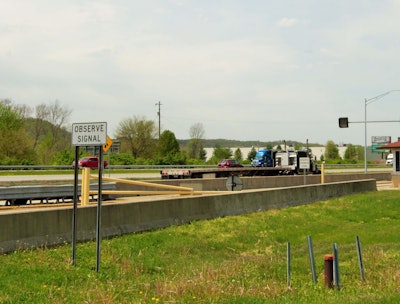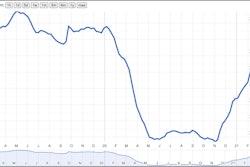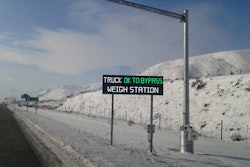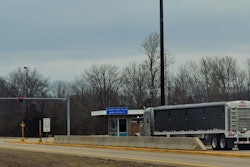 Do you utilize a bypass service in your operation? Vote in a new poll on the subject of bypass systems via this link or below.
Do you utilize a bypass service in your operation? Vote in a new poll on the subject of bypass systems via this link or below.Employees of the Missouri Department of Transportation and state Highway Patrol have served on the HELP Inc. board of directors in the past, as is the case currently for employees of 19 other states. The HELP nonprofit provides the now-longstanding PrePass bypass service in a majority of U.S. states in public-private partnership arrangements.
Those connections between state employees and HELP, however, have come under scrutiny, and their cozy relationships are being blamed, at least in part, for the delay in implementation of PrePass competitor Drivewyze, another national bypass service provider. HELP, meanwhile, contends that delays in Drivewyze deployment in Missouri are instead due to Drivewyze’s lack of investment in necessary sensory equipment in the state.
Allegations of conflicts of interest emerged in press reports in the spring of last year against Missouri highway patrol and DOT employees as the implementation of Drivewyze’s bypass service there seemed to be getting a new life after years of not getting off the ground. Missouri DOT and highway patrol employees serving on HELP boards withdrew from those boards around the same time, and an official audit was begun into the question of whether conflicts of interest were real.

Missouri’s state auditor announced findings last week, April 26, issuing a lengthy, detailed report about potential violations of law and state employees’ conflicts of interest in efforts engaged on behalf of HELP’s PrePass service.
As auditor Nicole Galloway put it in a press release issued by her office, the report “outlines years of improper communications and actions that led to one vendor being unfairly favored over another. Just as concerning is the appearance that these allegations were not taken seriously by state officials until much later, as our work was bringing the details to light.” Though the Missouri highway patrol in May 2017 announced it had conducted an internal review of conflicts of interest and employees would no longer serve on HELP’s board, the DOT in the state did not launch an official review until November of that same year.
Missouri highway patrol and DOT employees involved with HELP, the state auditor said, attempted to influence contracting decisions in Texas, Kansas and Minnesota by advocating for HELP and steering states away from competitors. In one instance, the auditor says, a state employee attended a conference and discussed the intention to endorse the services of HELP.
Perhaps more seriously for former Missouri state employees, within a year after leaving state employment, three were subsequently hired by or contracted with HELP. Two had business-related communications with the state of Missouri, including with former subordinates, the press release from the auditor notes, adding that Missouri law requires former state employees to wait at least a year after leaving state employment before performing any paid service in which they would attempt to influence decisions of an agency where they had supervisory duties. Former state employees also are prohibited from performing any paid service that relates to any decision in which they were directly concerned or personally participated while they were employed by the state.
HELP Inc. maintains that its board conducts itself ethically, and that members must abstain from any vote on a project or expenditure that “solely benefits his or her state.”
Furthermore, a central confounding issue in the delay Drivewyze has experienced in fully deploying its competing service in Missouri goes beyond just the alleged conflicts of interest. The issue has to do with the reality that weigh-in-motion (WIM) equipment in the state, unlike in other states, was paid for (to the tune of a $21 million investment, according to the auditor) and is wholly owned by the HELP nonprofit, and utilized in conjunction with the PrePass service. A lengthy comment from HELP board Chair John Esparza, also President of the Texas Trucking Association, was provided to Overdrive May 1, in which Esparza blames Drivewyze’s lack of success in the state not on undue influence from Missouri state employees involved with HELP but on the inability of the state to compel HELP to allow Drivewyze access to PrePass’ own WIM sensors, a necessary component of bypass programs there.
Missouri state law, Esparza maintains, requires “the weighing of trucks authorized for bypass.” When Drivewyze initially deployed in the state to conduct a pilot test of the service, the company, without access to existing PrePass weigh-in-motion sensors and the data emanating from them, thus “failed to comply” with that requirement.
“The [auditor’s] report does not mention these facts,” Esparza adds, facts he sees as central to the reason that Missouri ultimately ended its initial agreement with Drivewyze to deploy its bypass service there. The state auditor, who Esparza says “never contacted or interviewed two individuals named in the audit report who currently work for HELP in positions unrelated to Missouri” despite offers to connect, does detail the WIM access issue in the report, noting its unique structure among states. Most states do retain ownership of WIM equipment and data and allow bypass services to utilize them.
As noted at the top of this story, both PrePass and Drivewyze inked new contracts with the Missouri DOT to deploy services there in April of 2017. Since receiving the contract notification, Esparza says, “HELP has invested an additional $400,000 to ensure its [weigh in motion (WIM) sensors] continue to meet truck WIM weight screening standards established by the Federal Highway Administration.”
Yet Esparza says that, “despite all of Drivewyze’s press releases and claims, Drivewyze still has not installed a single WIM in Missouri more than a year after being notified of the contract award” in April 2017, “and continues to pursue a mandate requiring HELP to provide Drivewyze access to HELP’s WIMs and carrier data.” Esparza sees Drivewyze as essentially “attempting to leverage the long-term investment in Missouri made by HELP.”
Asked whether the company planned to deploy it’s own WIM equipment in the state, Drivewyze reps offered a statement from President and CEO Brian Heath that the company would be “restoring bypass services in Missouri for our customers in the coming weeks, starting with two Joplin sites. We are looking forward to continuing to work with both the Missouri Department of Transportation and Missouri State Highway Patrol to get the remaining sites up and running in the fastest and most efficient way possible.”











